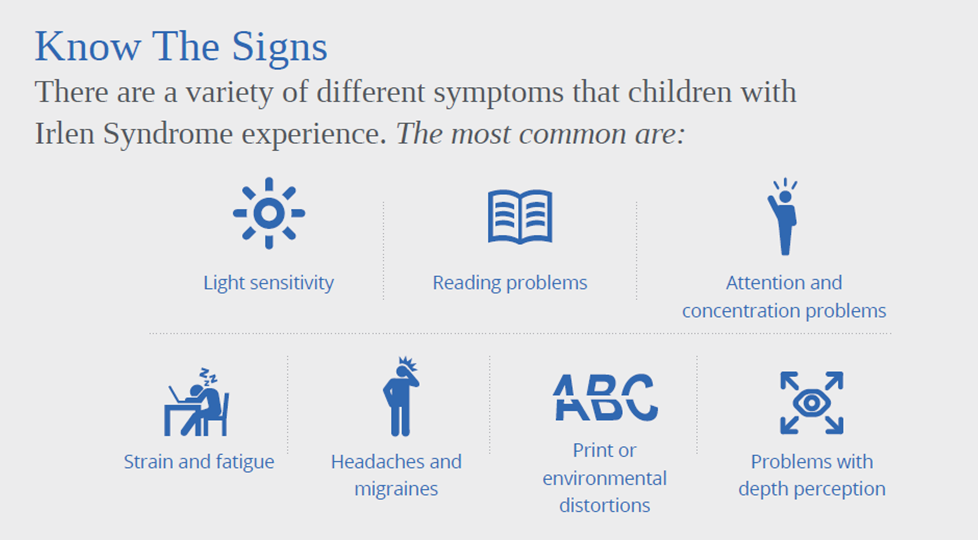Irlene Syndrome: A Comprehensive Guide To Understanding And Managing This Rare Condition
Irlene syndrome, a rare neurological disorder, has been gaining attention in recent years due to its unique symptoms and potential impact on daily life. This condition, often characterized by visual disturbances and cognitive impairments, affects a small percentage of the population. Understanding Irlene syndrome is crucial for those who may be experiencing its symptoms or know someone affected by it.
As a rare condition, Irlene syndrome is not widely discussed in mainstream health resources. However, its effects can significantly disrupt an individual's quality of life. This article aims to provide a thorough understanding of Irlene syndrome, including its causes, symptoms, diagnosis, treatment options, and management strategies.
Whether you are a healthcare professional, caregiver, or someone seeking information about this condition, this guide will equip you with the knowledge you need. Let’s dive deeper into the world of Irlene syndrome and explore how it impacts those who live with it.
- Barry Mcguigan Children A Heartwarming Look Into The Life And Legacy
- Where Is Patrizia Gucci Now The Untold Story Of Fame Fortune And Redemption
Table of Contents
- What is Irlene Syndrome?
- Causes of Irlene Syndrome
- Symptoms of Irlene Syndrome
- Diagnosis of Irlene Syndrome
- Treatment Options
- Managing Daily Life with Irlene Syndrome
- Impact on Mental Health
- Research and Advancements
- Support Resources
- Conclusion
What is Irlene Syndrome?
Irlene syndrome is a rare neurological disorder that primarily affects the brain’s ability to process visual information. Individuals with this condition often experience distorted perceptions of their surroundings, which can lead to difficulties in navigating everyday environments. While the exact prevalence of Irlene syndrome is unknown, it is estimated to affect fewer than 1 in 100,000 people worldwide.
Research into Irlene syndrome is ongoing, but scientists believe it may result from abnormalities in the brain's occipital lobe, which processes visual signals. The condition is typically diagnosed in early adulthood, although some cases have been reported in children. Understanding the nuances of Irlene syndrome is essential for developing effective treatments and support systems for affected individuals.
Key Characteristics of Irlene Syndrome
- Visual distortions, such as blurriness or double vision
- Difficulty recognizing familiar faces or objects
- Impaired spatial awareness
- Cognitive challenges, including memory loss and attention deficits
Causes of Irlene Syndrome
The exact cause of Irlene syndrome remains unclear, but several factors are believed to contribute to its development. Genetic predisposition, environmental triggers, and neurological abnormalities are among the potential causes under investigation. Researchers are actively studying these factors to better understand the underlying mechanisms of the condition.
- Huw Edwards Children The Untold Story Of A Broadcasting Legends Family Life
- Bianca Gascoigne Love Island The Ultimate Inside Story You Need To Know
Genetic Factors
Some studies suggest that Irlene syndrome may have a genetic component, as it tends to run in families. However, the specific genes involved have yet to be identified. Further research is needed to determine the hereditary nature of the condition and how it interacts with other factors.
Symptoms of Irlene Syndrome
The symptoms of Irlene syndrome vary from person to person but generally include visual and cognitive impairments. These symptoms can significantly impact an individual's ability to perform daily tasks and interact with their environment. Recognizing the signs of Irlene syndrome is critical for early diagnosis and intervention.
- Blurred or distorted vision
- Difficulty distinguishing colors
- Problems with depth perception
- Memory lapses
- Difficulty concentrating
Diagnosis of Irlene Syndrome
Diagnosing Irlene syndrome involves a comprehensive evaluation by healthcare professionals specializing in neurology and ophthalmology. Diagnostic tools such as MRI scans, EEGs, and visual field tests help identify abnormalities in the brain and visual system. Early diagnosis is crucial for developing an effective treatment plan tailored to the individual's needs.
Diagnostic Process
- Medical history review
- Physical examination
- Neurological assessments
- Imaging studies
Treatment Options
While there is no cure for Irlene syndrome, various treatment options can help manage its symptoms and improve quality of life. These treatments may include medication, therapy, and assistive devices designed to support visual and cognitive functions. Collaborating with healthcare providers is essential for creating a personalized treatment plan.
Medications
Certain medications can alleviate symptoms associated with Irlene syndrome, such as memory loss and attention deficits. Anticonvulsants and cognitive enhancers are commonly prescribed to address neurological challenges. However, medication regimens should always be tailored to the individual’s specific needs and monitored closely by a healthcare professional.
Managing Daily Life with Irlene Syndrome
Living with Irlene syndrome requires adapting to new challenges and finding strategies to maintain independence. Individuals with this condition can benefit from adopting lifestyle modifications, utilizing assistive technologies, and seeking support from family, friends, and community resources. These efforts can enhance their ability to navigate daily life successfully.
Lifestyle Modifications
- Organizing living spaces for easy navigation
- Using high-contrast colors to improve visibility
- Implementing routines to reduce cognitive overload
Impact on Mental Health
Irlene syndrome can have a profound impact on mental health, leading to anxiety, depression, and social isolation. The challenges of living with a rare condition can be overwhelming, making it essential for individuals to prioritize their mental well-being. Access to counseling services and support groups can provide valuable resources for coping with the emotional aspects of Irlene syndrome.
Coping Strategies
- Engaging in mindfulness practices
- Building a strong support network
- Seeking professional mental health support
Research and Advancements
Ongoing research into Irlene syndrome offers hope for improved treatments and a deeper understanding of the condition. Scientists are exploring new technologies, such as brain imaging and genetic testing, to identify potential breakthroughs in diagnosis and therapy. Staying informed about the latest advancements can empower individuals and families affected by Irlene syndrome to make informed decisions about their care.
Emerging Treatments
Innovative therapies, including neurofeedback and virtual reality training, are being tested for their potential to enhance visual and cognitive abilities in individuals with Irlene syndrome. These cutting-edge approaches may offer new possibilities for managing the condition in the future.
Support Resources
For those living with Irlene syndrome, access to reliable support resources is invaluable. Organizations dedicated to rare diseases and neurological conditions provide valuable information, advocacy, and community connections. Connecting with these resources can help individuals and families navigate the challenges of Irlene syndrome more effectively.
Recommended Organizations
- National Organization for Rare Disorders (NORD)
- Global Genes
- Rare Disease Clinical Research Network
Conclusion
Irlene syndrome is a complex and rare neurological disorder that requires a multidisciplinary approach to diagnosis, treatment, and management. By understanding its causes, symptoms, and available resources, individuals and families affected by this condition can take proactive steps to improve their quality of life. We encourage readers to share this article, leave comments, and explore other resources on our website for further information.
Together, we can raise awareness about Irlene syndrome and support those who live with it every day. If you or someone you know is affected by this condition, don’t hesitate to reach out to the support networks and healthcare professionals who can provide guidance and assistance.
Data Source: National Institutes of Health (NIH), Centers for Disease Control and Prevention (CDC), and peer-reviewed medical journals.



Detail Author:
- Name : Larissa O'Connell
- Username : thudson
- Email : parker.wade@bartoletti.com
- Birthdate : 2003-09-24
- Address : 4052 Henry Burg North Kane, NM 24350
- Phone : +1-907-330-3268
- Company : Luettgen-Casper
- Job : Construction Equipment Operator
- Bio : Excepturi maiores quam voluptas sapiente. Omnis voluptatem saepe aspernatur aut. Ut hic soluta autem. Tempora asperiores quidem asperiores id. Facilis enim nobis quo aliquid.
Socials
tiktok:
- url : https://tiktok.com/@litzy.beahan
- username : litzy.beahan
- bio : Qui sed eos et ducimus ea. Ipsum est laboriosam eveniet vel quo.
- followers : 4240
- following : 586
facebook:
- url : https://facebook.com/litzybeahan
- username : litzybeahan
- bio : Voluptatem ducimus quia soluta voluptatem vitae iure maxime architecto.
- followers : 4818
- following : 1993